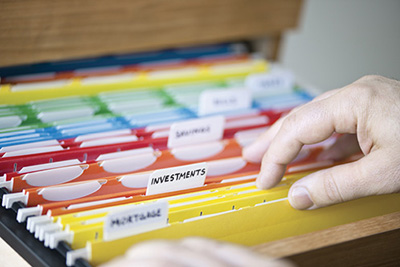Organize a Home Filing System
Guide G-229
Revised by Bryce Jorgensen
College of Agricultural, Consumer and Environmental Sciences, New Mexico State University
Author: Extension Family Resource Management Specialist, Department of Extension Family and Consumer Sciences, New Mexico State University. (Print friendly PDF)
An organized filing system is essential for good record keeping. Haven’t we all experienced the frustration of not being able to find some important paper?
Stuffing papers in the kitchen drawer or hall closet can be classified as record keeping, but obviously it is not the best system. The amount of time spent developing an orderly system for keeping your personal and financial records will be well spent and need not be difficult. Consider it a creative task.

© Elena Elisseeva | Dreamstime.com
There are many benefits to an organized filing system:
- Other family members can find documents.
- Records are available for income tax preparation.
- It saves time and money in processing insurance claims.
- Records may be needed in legal matters, such as divorces, lawsuits, estate settlements, or tax audits.
- Records may be needed on short notice in case of an accident, illness, or other emergency.
- Systematic record keeping aids in financial planning for things like preparing wills, net worth statements, investments, and retirement plans.
When you don’t properly store your records, you have a higher chance of misplacing and losing them. The consequences for losing and not keeping important documents can be costly for you:
- Pay more in taxes—If you don’t keep your estimated tax payment or estimated tax deductions slips, you will pay more than what those records claim.
- Criminal penalties—If you’ve received a license for operating a designated system and you don’t keep it, you can go to jail and receive a fine for not having it in your possession.
- Lawsuits—Keeping contracts in order to prove that you have complied and agreed to keep the laws and rules established from the person who offered the contract to you. This is also proof, for the person who offered the contract, that they will abide with what the contract states, and if they otherwise violate it, you can sue and claim a lawsuit against them.
How to Set Up Your Filing System
Your goal with creating your home filing system is to have an effective and useful system you can use for the rest of your life. If you’ve never organized a home filing system before and you have a clutter of receipts, insurance claims, wills, and other important documents, then get ready to roll up your sleeves and keep your weekend wide open because there is going to be a lot of sorting and cleaning. Here are the simple steps in arranging your filing system:
- Gather all your documents together—This first step will reduce your stress as you organize your filing and will kick you off to a great start. Look everywhere in your home—in every cabinet, kitchen drawer, and box—and gather every single document you find and keep it in one place. You will review each and every one of the documents you gather. Read through each document thoroughly and find any information that is on there that will help you verify if you need to store, recycle, shred, or question it to an attorney. For more information on which records you should keep and which are safe to discard, see NMSU Extension Guide G-228, What Records Should You Keep? (https://pubs.nmsu.edu/_g/G228.pdf). Keep your surroundings clean, open, and away from home traffic to avoid losing or ruining any of your documents because you will create different piles of paper to begin categorizing your documents. Keep a designated working space for your filing to avoid distractions and to have all your records in one space.
- Categorize your papers—This process is important for your future self. When you are searching for documents you need, this will ease the process of finding them. Keep the categories simple enough for you and someone else to understand. Color-coding and writing on the tab of the file folder will help you locate your records more readily.
Some suggested categories and headings for filing systems are listed in Table 1. It is not intended to be a complete list, but instead is a guideline that you can adapt to your needs. You may not want a separate file folder for all items listed. You may wish to consolidate some of the suggested items, use different headings or groupings, and include other items. For example, you may want a single file for insurance or you may want to file insurance papers under separate headings of “auto,” “home,” or “health.”
|
Table 1. Suggested File Categories |
|||
|
Addresses, Dates Business |
Equipment, Appliances Warranties |
Investments Annuities |
Autos and Vehicles Titles |
|
Financial Records Budget |
Organizations, Clubs Civic |
Bank Records Checking accounts |
Housing Mortgage payments |
|
Personal Records Educational records |
Correspondence Business |
Income Tax Previous returns |
Reference Material Cleaning |
|
Employment Records Employment contracts |
Insurance Policies Automobile |
Others of interest to you |
|
IMPORTANT: Consistency is key to keeping your home filing system in order. For the life of your filing system, you’ll be removing old records and inserting new ones. Therefore, you need to maintain and be consistent with the setup you arranged for your files.
An elaborate office is not necessary to store your filing system. Many reasonably priced items on the market can simplify record keeping, such as portable metal file boxes, ledger books, and inexpensive filing cabinets. Even sturdy paper cartons can be used to hold file folders. Old records can be boxed and stored in the attic or garage. Keep current records where they will be safe and convenient to use in your home.
Some items listed should go in a safe deposit box. However, you may want a file folder with related items or correspondence even though the main documents are in the safe deposit box. Put irreplaceable documents in safe deposit with others that would be costly or time-consuming to replace. Examples are mortgages, deeds, stock certificates, titles, birth and marriage certificates, some contracts, an inventory of household goods, one copy of your will, and divorce papers. Negotiable securities or bonds that could be cashed by someone else should always go in the safe deposit box. Keep a list at home of the contents of the safe deposit box.
Besides using a traditional home filing system, you can also use an electronic filing system. With this, you can scan or store electronic documents in an online storage network. Storing your files online makes it easy to retrieve your records in separate locations that have internet access. There are risks with online storage, such as having an unauthorized user hack into your account or having a virus in your computer that damages your records in your process of saving and sorting. The traditional way of filing requires for you to physically visit the filing cabinet to find the document, but storing online provides the option to pull it up on your computer or phone. There are advantages and disadvantages to each form of filing system, but it is for you to compare those elements. Guide G-228 (https://pubs.nmsu.edu/_g/G228.pdf) has more information about storing documents online.
References
Anderson, C. n.d. 5 fundamentals for setting up your home filing system [Online]. Retrieved from http://www.justorganizeyourstuff.com/joys/filing-system-how-to/34-how-to-set-up-a-really-good-home-filing-system-to-get-all-your-papers-organized#.W60OFy-ZPUI
Hamel, G. 2018, July 27. Advantages & disadvantages of traditional file organization [Online]. Retrieved from https://smallbusiness.chron.com/advantages-disadvantages-traditional-file-organization-41400.html
Larkin, E. 2018, August 29. How to organize a home filing system in 7 steps [Online]. Retrieved from https://www.thespruce.com/organizing-a-home-filing-system-2648257
Mason, J. 2012, June 28. Document retention series: Consequences of not keeping accurate records [Online]. Retrieved from https://www.securedocs.com/blog/2012/06/consequences-of-failing-to-keep-accurate-records
For further reading
G-228: What Records Should You Keep?
https://pubs.nmsu.edu/_g/G228/
G-247: Things To Do Before Making a Will
https://pubs.nmsu.edu/_g/G247/
G-258: Managing Your Family’s Money
https://pubs.nmsu.edu/_g/G258/
| Original author: Jackie Martin, Extension Family Finance Specialist. Subsequently reviewed by Constance Kratzer, Family Resource Management Specialist. |

Bryce Jorgensen is the Extension Family Resource Management Specialist at NMSU. He earned his Ph.D. at Virginia Tech. As a consultant, trainer, author, and speaker, he focuses on achieving individual, relational, and financial wellness for New Mexicans. An expert in the psychology of change, mindset, and behavioral economics, he provides customized programs leading to life and financial success.
To find more resources more resources for your business, home, or family, visit the College of Agricultural, Consumer and Environmental Sciences on the World Wide Web at pubs.nmsu.edu
Contents of publications may be freely reproduced, with an appropriate citation, for educational purposes. All other rights reserved. For permission to use publications for other purposes, contact pubs@nmsu.edu or the authors listed on the publication. New Mexico State University is an equal opportunity/affirmative action employer and educator. NMSU and the U.S. Department of Agriculture cooperating.
Revised November 2018 Las Cruces, NM


